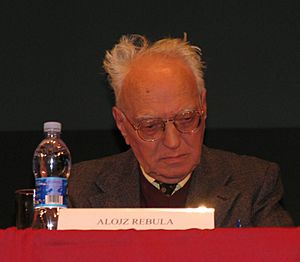Alojz Rebula facts for kids
Quick facts for kids
Alojz Rebula
|
|
|---|---|

Alojz Rebula in 2007
|
|
| Born | June 21, 1924 San Pelagio, Kingdom of Italy |
| Died | October 23, 2018 (aged 94) Topolšica, Slovenia |
| Occupation |
|
| Nationality | Slovenian |
| Notable works | The Roman Empress' Vineyard, Nocturne for Primorska, Matins for Slovenia, Maranathà or the Year 999, The Snake Flower, Tomorrow across the Jordan, In the Wind of Sybil The Shadow Dance Jacques Maritain: The Bearer of Sense |
| Notable awards | Prešeren Award 1995 for his literary work Acerbi Prize 1997 Nel vento della Sibilla Kresnik Award 2005 A Nocturne for Primorska |
| Spouse | Zora Tavčar (writer) (m. 1951–2018; his death) |
| Children | Alenka Rebula Tuta (poet) |
Alojz Rebula (born June 21, 1924 – died October 23, 2018) was a famous Slovene writer. He also wrote plays, essays, and translated books. He was an important member of the Slovene minority in Italy. Alojz Rebula lived and worked in Villa Opicina, near Trieste, Italy. He was also a member of the Slovenian Academy of Sciences and Arts.
Contents
Life Story
Rebula was born in a Slovene village called San Pelagio. This village is near Duino in what was then the Kingdom of Italy. At that time, the government tried to make everyone speak Italian. Because of this, Rebula could not go to school in his native Slovene language.
He went to Italian-language schools. There, he learned a lot about Italian culture and literature. He finished high school in 1944. After World War II ended, he moved to Yugoslavia. He studied classical languages at the University of Ljubljana. He graduated from there in 1949.
In 1951, he moved back to Italy. This was because of problems with the government in Yugoslavia. In 1956, he was not allowed to enter Yugoslavia. This was because he did not agree with the government's political system.
In 1960, Rebula earned his PhD degree from the Sapienza University of Rome. His special study was about Dante's famous book, The Divine Comedy, translated into Slovene. That same year, he was again stopped from entering Yugoslavia. This happened because he spoke out in newspapers against a book being banned in Slovenia.
In the 1960s, Rebula settled in Trieste. He worked there as a teacher. He taught Latin and Ancient Greek at schools where Slovene was the main language. He also helped with cultural activities for the local Slovene community.
Rebula also worked with another writer, Boris Pahor. They started a journal called Zaliv (The Bay). This journal aimed to share different ideas and support democracy. He also helped edit other literary journals.
In 1975, Rebula and Pahor published a book together. It was an interview with Edvard Kocbek. In this book, Rebula spoke about a sad event from 1945. This caused a big problem in Yugoslavia. Both Rebula and Pahor were not allowed to enter Yugoslavia for several years.
After Slovenia became an independent country in the early 1990s, Rebula wrote for several Catholic magazines. He lived and worked in his home village in Italy. Alojz Rebula passed away on October 23, 2018, when he was 94 years old.
His Writings
Rebula wrote many books. These included collections of essays, diaries, novels, plays, and short stories. His works have been translated into many languages. A well-known Slovene writer, Andrej Capuder, said that Rebula's work was "the best we Slovenes can show to the world today."
Rebula's writing often focused on three main ideas: ancient times, Christianity, and Slovene identity. He often found inspiration in the history, culture, and nature of the Slovenian Littoral region. He also wrote a novel about the life of a missionary named Frederic Baraga.
His stories often explored what it means to be human. They also looked at the challenges faced by small nations. His writing style was often poetic and thoughtful. He was especially known for his diaries and essays.
Rebula also translated important works. He translated Aeschylus' Seven Against Thebes and Plautus' Miles Gloriosus into Slovene. He also translated Slovene authors into Italian.
Rebula received several awards for his writing. In 1969, he won the Prešeren Fund Award. In 1995, he received the Prešeren Award. This is the highest cultural award in Slovenia. In 1997, he won the Acerbi Prize for his novel In Sybil’s Wind. In 2005, he received the Kresnik Award for A Nocturne for the Littoral. This book was chosen as the best Slovene novel of that year.
List of Works
Prose
- Devinski sholar, novel, (The Duino Scholar, 1954)
- Vinograd rimske cesarice , short stories, (Vineyard of the Roman Empress, 1956)
- Klic v Sredozemlje, novel, (A Call to the Mediterranean, 1957)
- Senčni ples novel, (Shadow Dance, (1960)
- V Sibilinem vetru novel, (In Sybil's Wind, 1968)
- Divji golob novel, (Wild Dove, 1972)
- Zeleno izgnanstvo novel, (Green Exile, 1981)
- Jutri čez Jordan novel, (Tomorrow over the River Jordan, 1988)
- Kačja roža novel, (Snake Flower, 1994)
- Maranathà ali Leto 999 novel, (Maranathà or the Year 999, 1996)
- Cesta s cipreso in zvezdo novel, (The Road with the Cypress and the Star, 1998)
- Jutranjice za Slovenijo novel, (Matins for Slovenia, 2000)
- Nokturno za Primorsko novel, (Nocturne for the Littoral, 2004)
Plays
- Savlov demon, six plays with a religious theme, (Saul's Demon, 1985)
- Operacija Timava, two acts, (The Timava Operation, 1993)
See also
 In Spanish: Alojz Rebula para niños
In Spanish: Alojz Rebula para niños
 | Emma Amos |
 | Edward Mitchell Bannister |
 | Larry D. Alexander |
 | Ernie Barnes |

